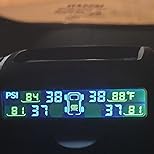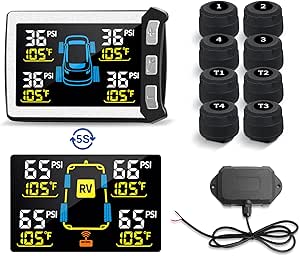When it comes to traveling with a trailer, ensuring your tires are in optimal condition is paramount for safety and performance. A Tire Pressure Monitor System (TPMS) can be a game changer for travel trailer owners, providing real-time data on tire pressure and temperature. This article will guide you through the essentials of choosing the right TPMS for your travel trailer, covering key features, benefits, and expert recommendations.
Understanding Tire Pressure Monitor Systems
A Tire Pressure Monitor System is designed to alert drivers about tire pressure fluctuations that could lead to blowouts or other dangerous situations. TPMS devices can be classified into two main types: direct and indirect.
- Direct TPMS: This system uses sensors mounted on the valve stems of each tire to measure tire pressure directly. It provides precise readings and alerts the driver in real-time.
- Indirect TPMS: This system uses the vehicle’s ABS (Anti-lock Braking System) to estimate tire pressure based on wheel speed. While more cost-effective, it tends to be less accurate than direct systems.
Why Invest in a TPMS for Your Travel Trailer?

Investing in a TPMS for your travel trailer offers several compelling advantages:
- Safety: Maintaining proper tire pressure reduces the risk of blowouts, which can lead to accidents.
- Fuel Efficiency: Properly inflated tires improve fuel efficiency, saving you money on long trips.
- Tire Longevity: Monitoring tire pressure helps extend tire life by preventing uneven wear caused by under-inflation or over-inflation.
- Peace of Mind: Real-time monitoring keeps you informed about your tire status, allowing you to focus on enjoying your travels.
Key Features to Consider

When selecting a TPMS for your travel trailer, several key features should guide your decision:
- Sensor Type: Choose between internal sensors (more accurate but require installation) and external sensors (easier to install but may be less reliable).
- Real-time Monitoring: Look for systems that provide real-time pressure and temperature readings for all tires.
- Alarm System: A good TPMS should alert you to significant changes in tire pressure or temperature, helping you respond quickly.
- Range: Ensure that the monitor can effectively communicate with the sensors over a distance sufficient for your trailer size.
- Durability: Opt for a system that can withstand varying weather conditions and road debris.
- Ease of Installation: Some systems require professional installation, while others are user-friendly enough for DIYers.
- Display Options: Consider whether you prefer a dedicated display unit or a system that can sync with your smartphone.
Top Recommendations for TPMS
Here are some of the top-rated TPMS options for travel trailers, based on expert reviews and user feedback:
1. TireMinder Smart TPMS

The TireMinder Smart TPMS is one of the most popular choices among RV and travel trailer owners. It features:
- Real-time pressure and temperature monitoring for up to 22 tires.
- Smartphone compatibility for easy monitoring.
- An alarm system that alerts you to critical changes.
2. EEZTire Wireless TPMS

The EEZTire Wireless TPMS offers a user-friendly interface and robust monitoring capabilities. Key features include:
- Monitoring for up to 12 tires.
- Fast and easy installation with no tools required.
- Rechargeable sensors that last longer than traditional batteries.
3. Flow Through Tire Pressure Monitoring System

This system stands out for its easy-to-use flow-through design, allowing for quick inflation without removing the sensors. Features include:
- Real-time pressure and temperature data.
- Durable sensor construction that withstands harsh conditions.
- Alarm alerts for pressure loss or overheating.
Case Study: The Impact of TPMS on Travel Safety

A case study conducted by the National Highway Traffic Safety Administration (NHTSA) revealed that equipped vehicles experienced significantly fewer tire-related incidents. For example, in a controlled group of RV owners who used a TPMS, the rate of blowouts dropped by 40% compared to those without monitoring systems. This study underscores the effectiveness of TPMS in enhancing travel safety.
Installation and Maintenance Tips
Once you have selected a TPMS, proper installation and maintenance are crucial for optimal performance:
- Follow Manufacturer Instructions: Always refer to the user manual for installation guidelines specific to your system.
- Regularly Check Sensors: Ensure that sensors are functioning correctly and that batteries are charged or replaced as needed.
- Routine Calibration: Some systems may require periodic calibration; follow the guidelines provided by the manufacturer.
Choosing the right Tire Pressure Monitor System for your travel trailer is essential for ensuring safety, enhancing fuel efficiency, and prolonging tire life. By understanding the different types of TPMS, evaluating key features, and considering expert recommendations, you can make an informed decision that suits your travel needs. As the case study demonstrates, investing in a TPMS can significantly reduce the risk of tire-related incidents, giving you peace of mind on your journeys. Remember to prioritize regular maintenance and monitor your system’s performance to maximize its benefits. With the right TPMS, you can focus on creating unforgettable travel memories while keeping your travels safe and enjoyable.